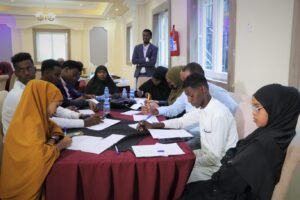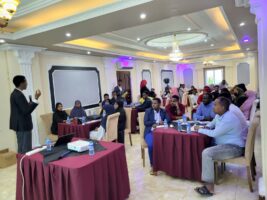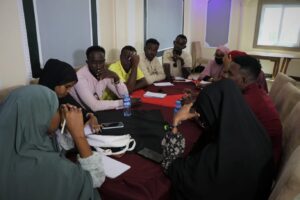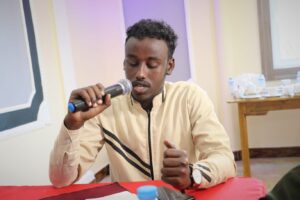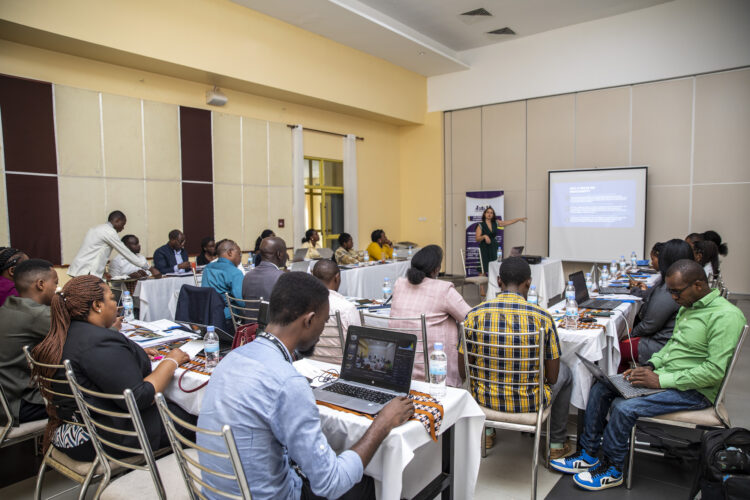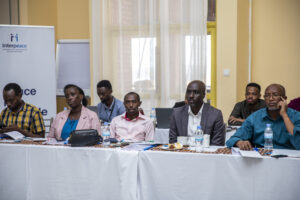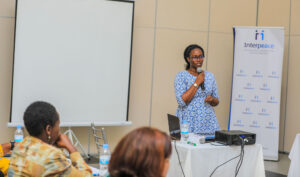Interpeace is honoured to welcome Amina Mohamed and Miriam Coronel Ferrer to its Governing Board. They were elected unanimously and their appointments confirmed at the forty-fourth Board meeting held on Wednesday, 6 December 2023.
The Governing Board also discussed the changing global conflict, security and peacebuilding landscape. And the Board reviewed Interpeace’s strategic direction.
Coronel Ferrer is co-founder of the Southeast Asian Women Peace Mediators, a platform of Southeast Asian women engaged in mediating, negotiating, and facilitating peace processes. A retired professor of political science at the University of the Philippines, she chaired the Philippine government panel that negotiated and signed the Comprehensive Agreement on the Bangsamoro with the Moro Islamic Liberation Front on 27 March 2014. Ms. Coronel Ferrer was a member of the United Nations’ Standby Team of Mediation Experts between 2018 – 2021. In this capacity, she provided mediation support to UN missions in Afghanistan, Iraq, Maldives, Kosovo, Georgia, and Southeast Asia, among others. Ms. Coronel Ferrer also supported various undertakings to advance the inclusion of women and youth in mediation and peace processes.
Mohammed has had a distinguished career in the public service of Kenya. She served in three ministerial portfolios, as Cabinet Secretary of Foreign Affairs and International Trade; Education, Science and Technology; and, Sports, Culture and Heritage. Ms. Mohamed was also Permanent Secretary for Justice, National Cohesion and Constitutional Affairs. She is a former United Nations Assistant Secretary-General and Deputy Executive Director of UNEP. Ms. Mohamed served as Ambassador and Permanent Representative at Kenya’s Mission to the United Nations in Geneva from 2000 – 2006.
Interpeace’s Governing Board is the highest decision-making body of the organisation and defines the organisation’s overall strategy. It is made up of prominent individuals from the government, international, and business sectors.
“We are honoured, motivated and inspired by the appointments of Miriam Coronel Ferrer and Amina Mohamed. We look forward to drawing on their wisdom and leadership as part of our Governing Board, so that we continue strengthening Interpeace’s peacebuilding work that is deeply rooted in communities with global reach,” said Itonde Kakoma, President of Interpeace.
“Women are the backbone of society. They are the most affected during conflict as their husbands and sons die, but they can also be inciters or drumbeaters of conflict.” Barwaqo Ahmed, County Gender Officer, Mandera.
In the remote region of Rhamu, located in northeastern Kenya near the Ethiopia border, there is a ray of hope amidst conflict. This area, which is about 73 kilometres to the west of Mandera County, has long been plagued by violent conflicts and forced relocations brought on by deeply rooted clan-based disputes. The conflict in Rhamu stems from territorial disputes and has had devastating consequences for the local communities. The violence, displacement, and profound socio-economic losses have left lasting trauma in their wake. Tensions have escalated between the Degodia and Murulle communities, particularly in Rhamu and Sala, which are located just 9 kilometres east of Rhamu. In response to this alarming rise in hostilities, efforts were made not only to address the immediate crisis but also to redefine the role of women in the broader peace process. In this context, a significant initiative has emerged to place women at the forefront of fostering peace and reconciliation efforts.

In October 2023, Interpeace and the Network for Peace, Cohesion, and Heritage (NEPCOH) organised a two-day women-only dialogue meeting. The event aimed to complement ongoing ceasefire initiatives by providing a dedicated space for 51 women from Rhamu and Sala to engage in dialogue. The objective was clear: to let the voices of these women resonate and contribute significantly to the ongoing pursuit of peace. The outcomes of this dialogue were far-reaching. A comprehensive strategy was developed, leading to the formation of a seven-woman grassroots committee, each representing the Murulle, Garre, Corner tribe, and Degodia communities, under the leadership of Zahara Bashir Ali, a member of the Board for NEPCOH and an active participant in Interpeace’s Kenya Programmes working group. This committee took on the task of actively promoting peace and harmonious coexistence among the communities in Rhamu and Sala.
The women-led grassroots committee hopes to advance the peace process in Sala and Rhamu by advocating for a ceasefire and implementing strategic tasks and interventions. By organising gatherings that bring together diverse groups, claiming their presence and voices in decision-making procedures, and assuming the role of early warning systems to stop conflicts from getting worse, they pledged to foster peace and reconciliation.

While the aftermath of the conflict has shown a decrease in violence, challenges persist, particularly for women. They navigate a delicate environment of fragile trust and limited social interaction. However, these women have discovered the power of sharing their personal stories. Their conversations revealed a remarkable familiarity, whereby they could readily identify one another by name, family connections, and their respective places of origin. The unexpected eruption of conflict was acknowledged as a collective shock, prompting a firm commitment to collaborate and disseminate peace throughout their communities.
“In Rhamu, we have been working for a long time, and a period of peace has been achieved. Now that some misunderstanding has taken place between two communities, we have seen it fit to engage the women in our peace dialogue meeting,” said Maalim Mahat, NEPCOH.
The journey towards lasting peace in Rhamu and Sala, with the support of the Federal Foreign Office of Germany, showcases women's key role in transforming conflict-ridden areas. This initiative is not just a community triumph but a global call to embrace and amplify the unique contributions made by women in peacebuilding efforts.

The Galkayo Peace Week is a significant effort to promote peace and stability in the city of Galkayo, which has been plagued by conflict and violence between the clans of Puntland and Galmudug since 1991. The peace week was initiated by the Mudug Joint Youth Peace Platform in 2021 following the Galkayo Peace Agreements, which aimed to end the ongoing conflict between the warring regions. The initiative was supported by Interpeace and its partner, the Puntland Development and Research Center (PDRC).
The most recent Peace Week took place in November 2023 and demonstrated the city's resilience and determination to move away from its troubled past. The event focused on sustaining and strengthening the peace agreements and promoting social cohesion. The thematic area for the conference was "Bridging Divides: A Discourse on Strengthening Social Cohesion, addressing clan revenge, and countering illicit drugs."

The Peace Week brought together various groups, including peace committees, joint police forces, traditional elders, the business community, youth, and women from both Galmudug and Puntland. The aim was to create a platform for constructive talks and discussions about past conflicts, with a vision of a joint administration and a more harmonious and prosperous future for Galkayo.
One of the key outcomes of the Peace Week was the creation of a four-point communiqué, which served as a roadmap for guiding discussions and reflections. The communiqué called on the international community, the Federal Government and the Federal Member States of Galmudug and Puntland to respond effectively to the ongoing challenges in the region. It also highlighted the significance of amalgamating the efforts of both administrative leaderships towards a joint administration.
The Peace Week included various activities such as dialogue sessions to address the clan conflict, fostering intergenerational dialogue, reflecting on past peace-building efforts with a focus on the role of women, and outreach activities aimed at promoting unity among communities. These events aimed to promote peace, reconciliation, and shared goals among the participants and build resilient communities capable of withstanding future challenges.

“To ensure lasting peace, it is essential to extend peace building initiatives and resources to rural areas, addressing their unique challenges and needs,” Asha Ali Bagag – Chair of Mudug Women Peace Committee.
The goals for the future include fostering continued dialogue and conflict resolution, evaluating and improving existing reconciliation mechanisms, empowering women in social reconciliation, raising awareness about peace, and strengthening collaborative networks. These objectives aim to solidify the gains made during the Peace Week and ensure a resilient and united Galkayo that can face future challenges effectively.
The Galkayo Peace Week is a significant initiative to promote peace, reconciliation, and social cohesion in a region plagued by conflict. By bringing together diverse stakeholders and addressing key issues, the Peace Week aims to lay the groundwork for a more peaceful and prosperous future for Galkayo.
“A lasting peace is possible when people can come together and be part in its process.” Abdullahi Abdirahman Minister of Livestock, Galmudug.
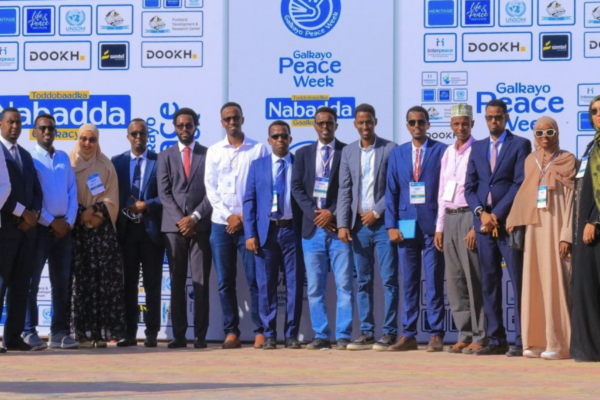
Interpeace welcomes the announcement of a temporary cessation in the conflict that has caused such deadly violence and devastation in recent weeks. This pause will be a vital period of respite for the civilian population. But this moment should also be grasped by all to redouble efforts to create the conditions to build towards a rapid and permanent end to hostilities and enduring peace.
Lasting solutions in war-torn societies must be locally led and owned, and be anchored by national and regional solidarity and vision if they are to overcome the root causes of tension and conflict. Upholding international norms and the rule of law, particularly in times of armed conflict, is foundational to peace and stability. The international community has a solemn responsibility to work tirelessly to silence the guns permanently, to support all those suffering from the conflict and loss, and to foster conditions on the ground for enduring peace.
Somalia has been in a prolonged violent conflict that has eroded community trust and confidence, social harmony, a sense of activism, constructive dialogue, and solidarity. This has been worsened by unregulated social media widely used by young people. However, the country has been recovering slowly in the last few years. To address these social problems, the Talo Wadaag II Programme organised two days of workshops from 8-9 July 2023 for Benadir women and youth. Talo Wadaag II is a community programme jointly delivered by Interpeace, the Heritage Institute for Policy Studies (HIPS) in Benadir and Galmudug, the Puntland Development Research Center (PDRC) in Puntland, and the Academy for Peace and Development (APD), in Somaliland.
The HIPS’ two-day workshops discussed the role of media and activism in social change, peace, and community harmony. Media workshops emphasised the role of media, particularly social media, in creating a positive atmosphere for social change, promoting peace, diversity in views, and tolerance in the war-stricken Somali society. During sessions, participants elaborated on how youth and women can utilise social media to advance community harmony, peace, state-building, and good governance, and at the same time, how youth can be aware of the negative aspects attached to social media. The workshops also presented opportunities for participants and well-established local experts to interact with each other and have critical and frank discussions on issues concerning the community.
The main workshop objectives included assisting participants in discussing the impact of media on social change, peace, and stability; helping them become aware of the negative impact of social media on society; facilitating interactive discussions on the importance of activism for social change; helping participants advocate for human rights as well as responsibilities; urging them to participate actively in statebuilding, governance, and democratisation; and finally enhancing their critical thinking and questioning mass media information.
“The workshops have created a friendly, constructive, and community space for dialogue in which they exchanged their experience and insights. While young people’s knowledge and practical experience in social media were huge, older women also shared their living experiences and wisdom linked to social media,” stated Dr. Yusuf Sheikh Omar, the Director of HIPS’ Talo Wadaag II programme.
For instance, a woman named Farhia Ali Hajji from the Somali Women Development Centre expressed how social media has influenced her thoughts and feelings. She was inspired by the disheartening story of a young girl she saw on social media. This young girl was carrying a jerrycan of water because her family could not find an alternative water source. To help her, someone posted this young girl’s life difficulties on social media, a post that has finally changed the young girl’s life. People who watched that post offered a lot of support to the girl’s family, which enabled the girl to enrol at school and her family to build a house and start a small business. “That really touched me, and it clearly shows how social media is a powerful tool if used properly,” recounted Farhia.
Several young people also voiced the positive impact of the workshop on the participants. As Sumaya Mohamed from the Somali Youth Civic Organisation put it: “One valuable takeaway I gained from this programme is the ability to effectively advocate for diverse societal issues and represent the people's interests. Another aspect of the programme that greatly resonated with me was…the media's significant influence in driving social change.”
Sharing knowledge and experiences also helped participants increase their awareness of the enormous negative impact of social media on society, particularly youth. “I discovered that young people spend a lot of time on social media with the goal of merely scrolling and not learning or taking advantage of it. "They also post other people's private information without their knowledge,” said Abdirahman Mohamed Ahmed from the Somali Youth Development Network.
Dr. Yusuf Omar explained that the interactive workshop sessions have assisted participants in exchanging touching stories drawn from their everyday life experiences related to social media. Such shared knowledge has deepened their awareness and understanding of the power of media and the culture of activism as critical factors for social transformation. The workshops have also broadened participants’ perspectives and sharpened their skills in advocating for and promoting much-needed societal transformation. "I have learned so many things, such as being an activist and advocating for voiceless people... Social media can be useful with huge advantages, but sometimes it can have disadvantages,” said Aisha Yusuf Hassan from the Somali Youth Development Network. In another account, Ms. Magda Abdi from Benadir Women’s Human Rights and Development Organisation expressed her views regarding active citizens' role in social change by saying, “What interested me the most was that an active citizen is able to make a lot of positive changes in their country”.
Ms. Saida Hassan, a research assistant at Talo Wadaag, has confirmed the participants’ testimonials. "I felt that both women and youth have shown a lot of interest in civic education, activism, and social media workshops. Their body language and comments demonstrated how engaged they were. I have no doubt that these workshops have increased their awareness of women's and youth’s expected roles in statebuilding, politics, and social change in general. They have learned if there will be an election in the future, why they will vote, and the quality of whom they will vote.”

Poor parenting skills, lack of communication between family members and negative gender norms affect family cohesiveness and community cohesion. The baseline survey conducted by Interpeace in 2021 to inform its four-year holistic peacebuilding programme in Rwanda, revealed that they further contribute to exacerbating family conflicts and gender-based violence (GBV), thus tearing apart families.
The study identified four primary forms of GBV, including physical, economical, sexual, and psychological, experienced by both women/girls and men/boys across five districts, which cause family dysfunction and increase alcohol or drug abuse and delinquency among young adults. They also affect the socio-economic development of families and communities.
Interpeace and its partners, together with the Rwanda Men’s Resource Centre (RWAMREC), developed a curriculum that promotes positive masculinity and positive parenting norms and practices, targeting couples, older adolescents, and inmates as a contribution to existing efforts. More specifically, the curriculum targets parents, children between 12 and 24 years old, married couples and inmates nearing their release.
The curriculum proposes a gender-transformative approach in which the target population are encouraged to critically reflect on negative gender norms and stereotypes to challenge them and adopt more gender-equitable behaviours within families and communities.
The 2021 survey highlighted that more common forms of GBV identified are 10% higher in women than men. The curriculum will engage men and boys, alongside women and girls, to challenge rigid and negative notions of masculinity and negative parenting practices and adopt positive, nurturing, empathic, equitable, and caring ones.
If successfully implemented, it is expected to contribute to reducing sexual and gender-based violence and domestic conflicts, juvenile delinquency, fostering family communication and gender equality in families and communities.
“We decided to work on masculinities through engaging boys and girls to understand their vulnerabilities and resilience from a gender perspective and to address gendered drivers of family conflicts, to strengthen gender resilience and to promote women empowerment. We hope that this curriculum will improve knowledge and attitudes and practices on gender equality, positive masculinity, and parenting,” noted Frank Kayitare, the Country Representative of Interpeace, in his welcome remarks at the curriculum validation workshop on 5 October 2023 in Kigali.

The four-module curriculum will complement other existing tools and policies on gender equality and family. It is aligned with the National Policy against Gender-Based Violence as well as the revised 2021 National Gender Policy, especially its priority area four, which seeks to leverage positive cultural norms that support best practices for gender equality, as well as priority area five on engaging men and boys in gender advancement. The Guest of Honor at the curriculum validation event, Aline Umutoni, Director General in charge of Family Promotion and Child Protection at the Ministry of Gender and Family Promotion (MIGEPROF), commended this initiative. “This curriculum is unique as it targets critical groups of people. It contributes to building a Rwandan society free from violence and conflicts,” highlighted Umutoni.
This curriculum will be implemented by various actors, including government structures and Civil Society Organisations (CSOs) from national to local levels. 27 people from those institutions have already been trained to train others for a quick and wide dissemination of the curriculum.
Structure of the curriculum
This preventive curriculum is made of four modules. The first two modules target couples within communities in both rural and urban areas. The first one targets couples with the main objective of improving equitable gender relationships between spouses and preventing or mitigating domestic violence, while the second targets couples as parents to encourage them to adopt positive and gender-equitable parenting and reduce harsh punishment towards children.
The third module targets adult male inmates in prisons to raise their awareness about positive masculinity practices to reduce the risk of committing GBV-related crimes once they reintegrate into their families and communities after release. The fourth module targets young people between 12 and 24 years old, in schools, within communities, and in rehabilitation centres to advance positive masculinity, healthy relationships and prevent GBV among young people.
Each module is meant to be delivered in a group setting, targeting groups of 24 people. It will be facilitated by two well-trained community-based volunteers (female and male). The latter will facilitate education sessions to be held once a week for six consecutive weeks. Sessions should be interactive and must feature role plays, group works, case scenarios analysis, visuals, individual or in-pair reflection, as well as plenary discussions.
The curriculum was developed in partnership with the Rwanda Men's Resource Centre (RWAMREC), an NGO advocating for gender equality, positive masculinities, and engaging men to eliminate gender-based violence.Its implementation will complement other Interpeace’s interventions, such as Multifamily healing therapy, a community-based psychological intervention that addresses intra and extra-family conflicts and builds family communication and cohesiveness in safe spaces.
